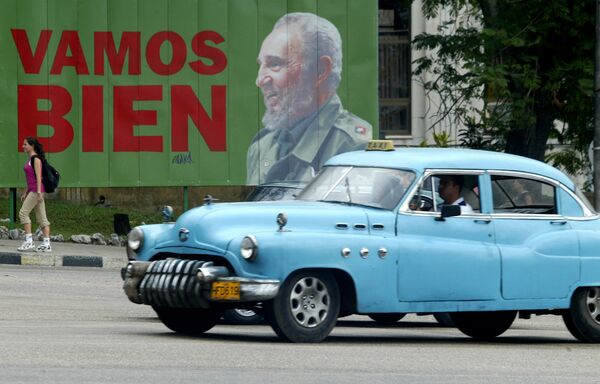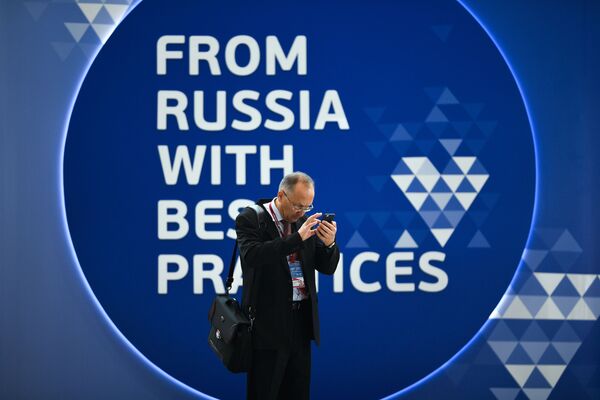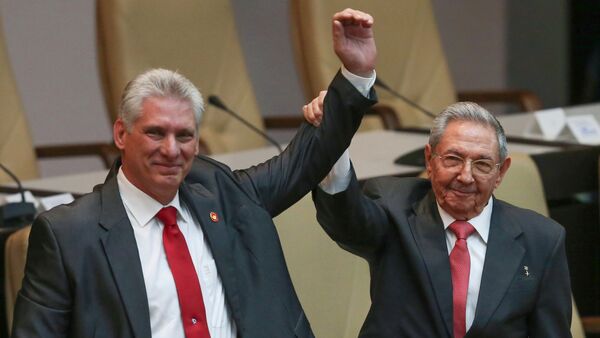The presidential talks are expected to feature topics related to the Russian-Cuban strategic partnership in various areas, as well as the international agenda.
The meeting between Diaz-Canel and Medvedev will be focused on bilateral cooperation specifically in trade, investments, energy, industry, transport, agriculture, humanitarian, as well as other areas. The sides are also expected to tap into the implementation of agreements reached pursuant to the Russian prime minister's official visit to Cuba earlier in October.
Russian-Cuban High-Level Dialogue
The Cuban leader's official visit to Russia began on Sunday in the country's second largest city St. Petersburg. He was received by Chairman of the Committee for External Relations of St. Petersburg Evgeny Grigoriev as well as the Cuban ambassador to Russia. On Monday, he held talks with St. Petersburg Governor Alexander Beglov and visited the Piskaryovskoye Memorial Cemetery, dedicated to the victims of the 1941-1944 Siege of Leningrad during World War II.
Russia's presidents have paid a total of three official visits to Cuba: Medvedev in 2008, and Putin in 2000 and 2014. In 2014, Putin's visit brought about a set of agreements signed regarding bilateral cooperation in international info-security, energy, industry, culture, and health care. At the time, the Russian president also held talks with Cuban revolutionary leader Fidel Castro and First Secretary of Cuba's Communist Party Raul Castro.

Diaz-Canel visited Moscow in 2018 as President of Cuba's Council of State.
Diplomatic relations between the two states were established in 1902, with a brief pause from 1952-1960. At the core of the nations' bilateral cooperation are the 1996 Declaration of Principles of Russian-Cuban relations and the 2009 Memorandum on Principles of Strategic Partnership. Since then a high-level dialogue between Moscow and Havana has been maintained on a continuous basis.
Broad Scope of Moscow-Havana Relations, Both at the State and Regional Level
Earlier in the day, the Cuban president and St. Petersburg governor outlined new areas for potential cooperation.
In May 2018, Russia and Cuba signed an agreement on the facilitation of a visa regime authorising a mutual permit for up to a 90-day visa-free stay. The agreement was signed by Ricardo Cabrisas, the vice president of Cuba's Council of Ministers and Minister of economy and planning, and Russian Foreign Minister Sergei Lavrov during the St. Petersburg International Economic Forum.

The countries' bilateral trade demonstrates a tendency for growth, having increased 33.7 percent from 2017 to 2018 and another 1.3 percent in 2019. At the core of Russian-Cuban trade is energy and the metal industries.
Russia's exports to Cuba are predominantly machinery, equipment and transport means, food and agricultural products, metals and metal goods, minerals, chemicals, wood, and paper. Imports from Cuba include foods and agricultural products, machinery, metals, minerals, and chemicals.
The two countries cooperate in education and science, with the priority areas being astronomy, geophysics, agriculture, paleontology, and material science. Cuban students have an annual quota of 100 spots with scholarships at colleges in Russia.


